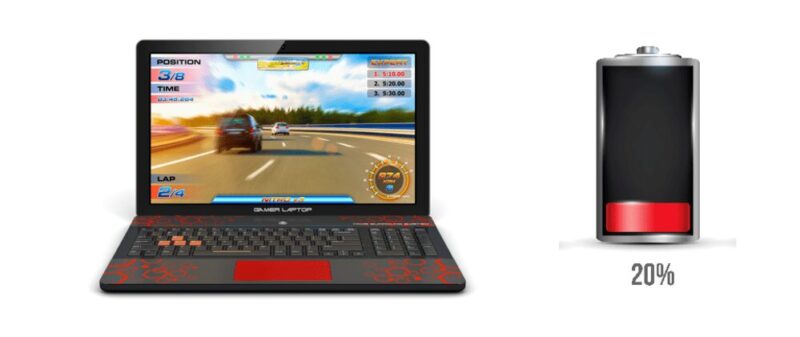Gaming laptops are an excellent option for anyone who needs the portability of regular laptops but also wants to play games on them regularly. Still, gaming laptops have some disadvantages, mainly less powerful batteries. There are many reasons why gaming laptop batteries drain so fast, for instance:
- Playing high hardware demanding games
- Corrupted firmware
- Many processes run in the background
- Brightness setting of the display is too high
- Battery runs too hot
- Wrong system settings
If you buy a new or used gaming laptop, remember that the battery does not last over 2-3 hours when running games in most cases. More expensive gaming laptop batteries also drain quickly if a hardware-demanding game is running.
What components are built into the laptop can make a big difference on how long the battery lasts before you have to connect the plug for recharging. More potent hardware gives you more headroom for gaming but also requires more electricity to run.
How To Fix A Laptop Batteries That Dies Fast
If your laptop’s battery drains quite quickly when playing games or just browsing the web and watching videos, there are a few steps you can take to increase the battery’s lifespan, such as:
- Change Brightness Settings: The higher your brightness setting for the monitor, the more energy will be consumed per minute. Reducing the brightness a bit can save a few percentages on the battery every hour.
- Keep The Battery Cool: While playing games or doing other heavy tasks on your laptop, the entire system heats up, including the battery. The hotter the battery becomes, it’s efficiency will drop.
- Change The Systems Settings: Changing your laptop’s performance settings is one of the easiest ways to reduce energy consumption. Windows provides three energy plans: balanced, power-saving, and performance.
- Close Background Processes: Closing an application by clicking the X doesn’t shut it down in most cases. By opening the Task Manager and shutting down unused programs can reduce energy consumption.
- Keep The System Up-To-Date: Installing the latest updates can optimize energy consumption, but results are small most of the time. Combining this step with others is recommended.
- Optimize Game Settings: If you play hardware demanding games such as Cyberpunk 2077, Call of Duty, or Battlefield, reducing the graphic settings can reduce energy consumption a lot. On lower settings, it’s possible to double the time you can play compared to high settings.
- Eject Inserted Discs: Running disc drives can be a reason for increased power consumption, especially if you transfer a lot of data. Removing the disc drive by pressing the eject button on the side can save you a few percentages on the battery.
- Disable Keyboard Backlight: Many modern gaming laptops feature keyboard backlighting to increase visibility, and it also looks cool. However, those backlights can cause the battery to drain a lot faster. If you’re on a trip and want to save battery, make sure to turn them off.
- Deactivate Bluetooth & WiFi: When you don’t need Bluetooth and WiFi, you can reduce energy consumption quite a bit by deactivating them.
Completing a few of the steps above can make your laptop battery last longer. However, you get the best results by completing all of them. Especially optimizing game settings, closing background processes, and keeping the battery cool can make a big difference.
Should I Remove My Laptop Battery While Playing Games?
While gaming, batteries of gaming laptops tend to heat up a lot, causing a loss in efficiency. So, is it better to remove the battery while gaming, or can you leave it in it’s place?
Generally, it is recommended to unplug the laptop from the charger when the battery is full, as it can reduce the life cycle of the battery and can cause irreparable damage. To prevent damage to the battery, you can remove it from the laptop. The laptop will then only use electricity provided by the charger.
If you want to charge the battery while gaming, you can insert the battery into the laptop without causing any damage to it. But remember, if it is fully charged, remove it from the system if you want to continue gaming.
What Kills Laptop Battery Life?
Over the lifespan of each laptop, batteries tend to lose storage capacity. However, there are also a few things that can kill battery life if done repeatedly, such as:
- Don’t fully discharge the battery
- Do not leave your laptop running 24/7
- Don’t plug the laptop 24/7. Only plug it when it needs charge
- Do not keep your laptop fully charged. The battery needs to be emptied every so often
- Avoid high battery temperatures
If you have a separate pair of batteries for your gaming laptop, make sure to store them right so they don’t lose storage capacity. According to BatteryUniversity’s article, you should store Lithium-based batteries at 40-50% charge on 0°C for the best results.
How long should a gaming laptop battery last?
The battery life of a gaming laptop can vary greatly depending on a number of factors, including the laptop’s hardware, the intensity of the gaming, the settings used, and the efficiency of the laptop’s power management.
As a rough estimate, a gaming laptop might last anywhere from 2 to 8 hours on a single charge. More intensive gaming can quickly drain the battery, potentially bringing this down to 1-2 hours, while less intensive use or non-gaming tasks (like web browsing or word processing) could stretch the battery life to the longer end of that range.
Keep in mind that gaming laptops, with their high-powered components, are not typically designed with long battery life in mind. They are often used plugged in for best performance. If you want to maximize your gaming laptop’s battery life, consider lowering your screen brightness, closing unnecessary background programs, and using power saving modes when you’re not gaming.
Why is my laptop battery draining when I play games?
When you’re playing games on your laptop, the laptop’s components are working harder and require more power. Here’s a breakdown of some of the factors involved:
- Graphics Card (GPU): Most games require significant graphical processing power. If you’re playing a game with high-resolution graphics or complex animations, your laptop’s graphics card has to work harder. This can cause a significant increase in power consumption.
- Processor (CPU): Games also tend to require a lot of processing power. The more complex the game, the harder your processor has to work. This can also increase power consumption.
- Screen: The brighter your screen is, the more power it uses. If you’re playing a game, you probably have your screen on and relatively bright, which can use a lot of power.
- RAM and Hard Drive: Games require a lot of memory and disk space, especially games with large, open worlds or complex mechanics. Accessing this data uses power.
- Sound: If you’re using your laptop’s speakers, this can also use some power.
- Heat: All this extra work can make your laptop heat up, which means the fans have to work harder to cool it down, using more power.
- Peripherals: If you have gaming peripherals like a gaming mouse or keyboard connected to your laptop, these can also drain battery life.
How do I reduce battery drain while gaming?
Here are some strategies you can use to reduce battery drain while gaming on your laptop:
- Lower Screen Brightness: The display often uses a significant amount of power. Lowering the brightness can help extend battery life.
- Close Background Applications: Any software running in the background can use CPU, memory, and thus power. Close any unnecessary applications to help reduce power usage.
- Use Power Saving Modes: Most laptops have power saving options in the operating system’s settings. These can lower performance in favor of saving power. Note, however, that this can also reduce gaming performance.
- Limit Game Settings: Most games have graphics settings that can be adjusted. Lowering the resolution, reducing graphics quality, or turning off power-hungry options like anti-aliasing or real-time shadows can reduce the load on your GPU and CPU, saving power.
- Update Your Software: Ensure your operating system, drivers, and game software are all up to date. Updates often include optimizations that can improve power efficiency.
- Unplug Peripherals: If you have any peripherals plugged in that you aren’t using, such as an external mouse, keyboard, or headset, unplug them to save power.
- Optimize Battery Settings: Make sure your laptop’s battery settings are optimized. You can usually find these in the “Power & Sleep” settings on Windows or “Energy Saver” on macOS.
- Clean Your Laptop: If your laptop is heating up, it could be due to dust buildup. This can make your laptop work harder and drain the battery faster. Cleaning out the fans can help keep your laptop cooler and running more efficiently.
Is it possible to drain laptop battery faster than charging it?
Yes, it is possible for a laptop’s battery to drain faster than it charges, especially if you’re using a lot of power-intensive applications or tasks such as gaming, video editing, or running complex simulations.
This can occur for a few reasons:
- High Power Demand: If the power demanded by the laptop’s components (like the CPU, GPU, hard drive, screen, etc.) is greater than the power supply can provide, the laptop will start to use the battery to supplement the power it needs.
- Inefficient Charger: If your laptop’s charger isn’t supplying enough power, or if it’s damaged or not functioning properly, it might not be able to keep up with the laptop’s power demand.
- Battery Health: Over time, laptop batteries degrade and aren’t able to hold as much charge. If your battery is old or in poor health, it might not be able to charge as quickly or hold as much charge.
- Laptop’s Power Management Settings: Some laptops have power management settings that can affect how quickly the battery charges. For instance, some settings may limit the charge rate to extend the overall lifespan of the battery.
It’s worth noting that continually draining your battery faster than it charges isn’t typically good for the battery’s long-term health. If you frequently find yourself in this situation, you may want to consider using less power-intensive settings or tasks while on battery power, or using your laptop plugged in whenever possible.







